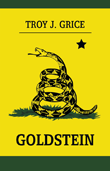Before I changed my major to econ in 1996 I thought it was some complicated science that was the domain of bespectacled, bow-tie wearing poindexters. Especially macro.
When taught abstractly it can be daunting. But this complexity is all a ruse. Economists know that their science is a very simple and qualitive discipline. Many economists feel the need to "sex it up" so they can convince people to give them jobs explaining the obvious. Government economists are hardly a notch better than lawyers.
Econ is a science that tries to explain the alternatives in the allocation of limited resources. The same rules apply at the macro level as do at the individual level.
It all starts with a need. This need causes an individual to take an action to address the need. The chosen action is a function of his limited options and risk vs. reward of those options.
Hunger is a need. Hunting and gathering are productive options. The relative risk and reward of the available options are weighed by the individual and then he acts. Each person has their own concept of risk and reward. There is no one order that applies to all. Some prefer apples to oranges and some prefer oranges to apples. When some bureaucrat gets involved in ranking those preferences on individual's behalf, he can make a god-awful mess of things.
Individuals can act economical in isolation. But specialization and trade makes even more options available to the individual. Imagine if you could not trade, if you had to do everything yourself: Build your own shelter, hunt your own food, make your own clothes. You would certainly have full employment but your life would be a miserable hell as you toiled night and day. The bottom line: Specialization and trade are good. The more you have available to consume the better off you are.
In order to enhance future productivity, you can forgo some current consumption in order to make or acquire tools. Economists call this capital investment. The catch is that consumption today is worth more than the same amount of consumption in the future.
So putting it all together: There is a need. The need causes productive action. That production can be directed towards consumption, trade, or used to increase future production. That's really all there is to it. Don't let Wall Street analysts and baldheaded bureaucrats try to confuse you.
Distort one aspect and the system responds quite predictably.
Less abundance of goods and services means you will be worse off. Anti trade measures lessen the abundance of goods and services (unless you directly benefit from the protection scam).
Fixing prices will create a shortage. Worse yet, you will destroy the profit signal that compels producers to increase supply!
Discourage capital investment by taxation and future productivity will be less.
Increasing supply causes prices to fall. Print money- the value of money falls. Please inform your Federal Reserve Chairman Counterfitter of this!
That should be enough to get you started...
Subscribe to:
Post Comments (Atom)



No comments:
Post a Comment